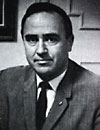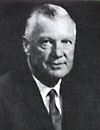North Carolina
Gov. William Richardson Davie
- December 7, 1798 - November 23, 1799
- Federalist
- June 20, 1756
- November 29, 1820
- Other
- Queen's Museum College, Princeton University
- Married Sarah Jones; six children
- Army, National Guard
About
WILLIAM R. DAVIE was born in Egremont, England on June 20, 1756. Around 1763 he immigrated to South Carolina, where he lived with an uncle. His education was attained at Queen’s Museum College in North Carolina, and at Princeton University, where he graduated in 1776. He went on to study law, however, his legal career was temporarily interrupted with the outbreak of war. Davie entered the army as a lieutenant in Pulaski’s Legion in April 1779. Promoted to captain shortly afterward. Davie was wounded at Stono Ferry on June 20, 1779. After recovering he led a small regiment of North Carolina militia dragoons and was awarded the rank “colonel-commandant of the cavalry” by the North Carolina Assembly. During the 1781 campaign he served as Nathanael Greene’s commissary-general. After his military service, he established a successful legal practice in Halifax. Davie first entered politics as a member of the North Carolina House of Commons, a position he held from 1786 to 1798. He took an active role in the 1787 federal constitutional convention, as well as participating in the 1788 and 1789 state conventions, where the later convention ratified the federal constitution. He also was instrumental in founding the University of North Carolina, and in 1810 was bestowed with the title of “Father of the University”. Davie next won election to the governorship in 1798. During his tenure, a boundary disagreement with South Carolina was negotiated; and a land grant scandal was dealt with. After leaving the governor’s office, Davie secured an appointment to serve as peace commissioner to France. His last bid for political office, came in 1803, when he ran unsuccessfully for a seat in Congress. Governor William R. Davie passed away on November 29, 1820, and was buried in Old Waxhaw Presbyterian Churchyard in Lancaster County, South Carolina.
Note: “National Guard” refers to Davie’s service in the North Carolina militia.
Source
North Carolina Department of Cultural Resources (search keyword: Governors)
The North Carolina Department of Public Instruction
Sobel, Robert, and John Raimo, eds. Biographical Directory of the Governors of the United States, 1789-1978, Vol. 3, Westport, Conn.; Meckler Books, 1978. 4 vols.











